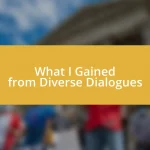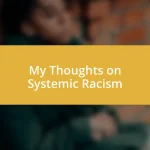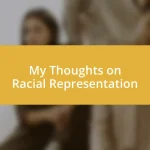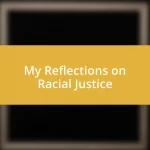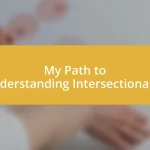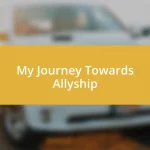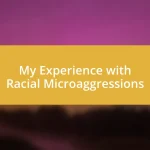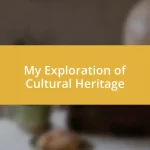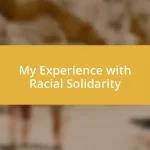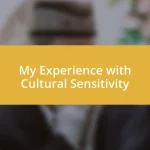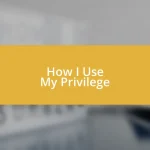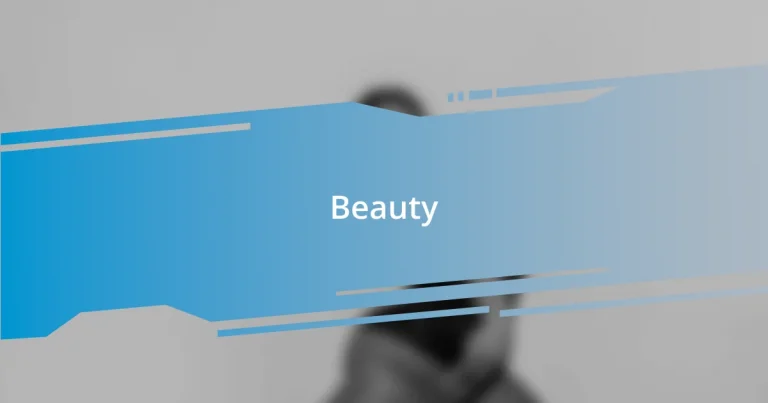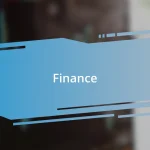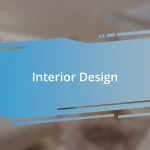Key takeaways:
- Disability Pride emphasizes self-acceptance and community, transforming perceptions of disability from deficit to a source of strength and creativity.
- Celebrations within the disability community foster unity, raise awareness, and empower individuals, helping to dismantle stereotypes and validate personal experiences.
- Engaging in advocacy and sharing personal experiences cultivate strong connections and mobilize efforts to push for policy changes, highlighting the collective strength of the disabled community.
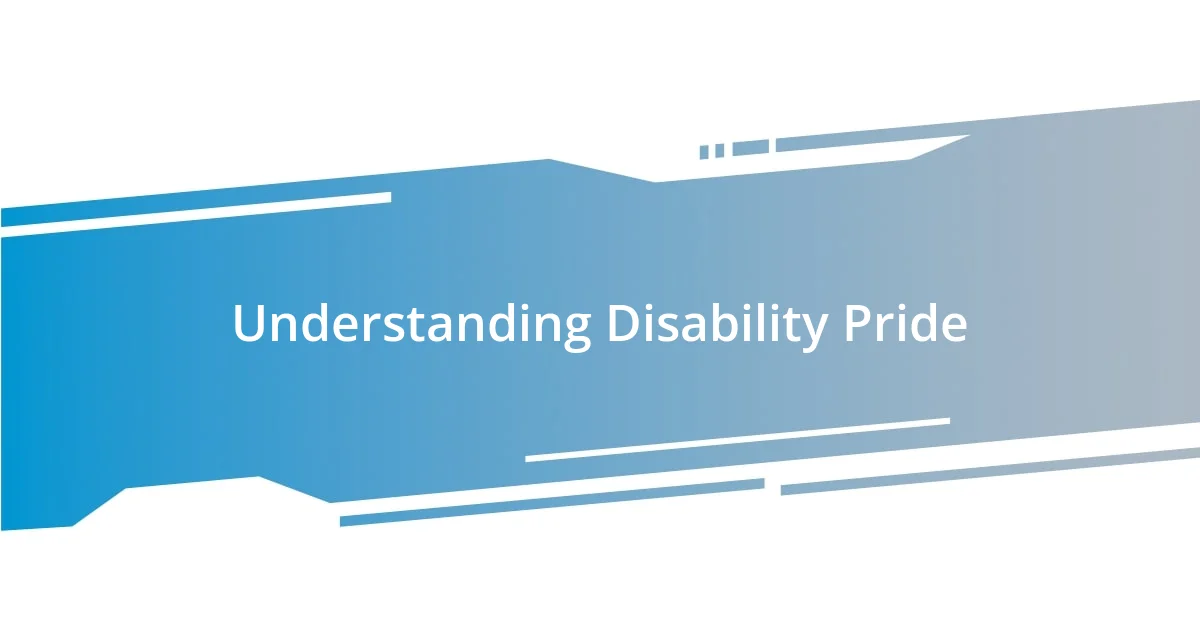
Understanding Disability Pride
Disability Pride is a powerful affirmation of identity and community, celebrating the rich diversity within the disabled population. When I first became aware of Disability Pride, I remember feeling an exhilarating mix of validation and hope. Was I alone in my struggles? Absolutely not. This movement embraces the idea that disability is not a deficit but an essential facet of who we are.
At its core, Disability Pride challenges societal norms around ability and encourages self-acceptance. I vividly recall a local pride event where people shared their stories and talents, turning what was often perceived as a limitation into an incredible show of strength and creativity. Isn’t it inspiring to think about the beauty in our differences, rather than viewing them through a lens of pity?
Engaging with Disability Pride has forever changed my outlook. I learned to view my own experiences, not as burdens but as unique narratives that contribute to a rich tapestry of lived experiences. How often do we celebrate our journeys instead of hiding them? Understanding Disability Pride invites us all to acknowledge our unique stories and to stand tall, celebrating our identities.
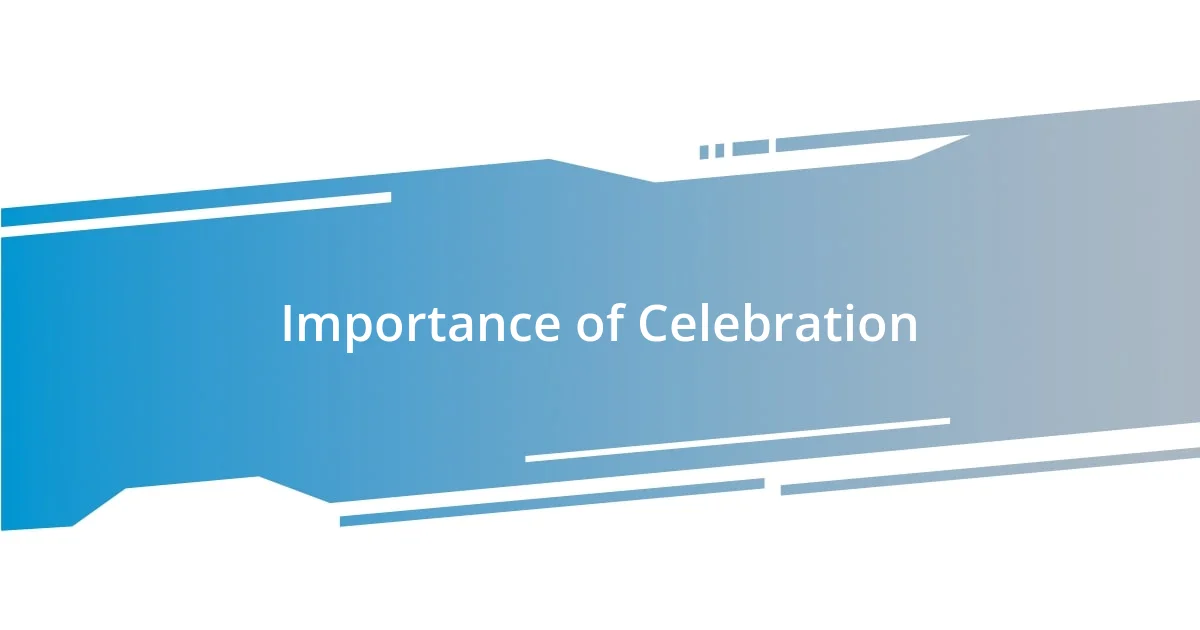
Importance of Celebration
Celebration plays a vital role in fostering a sense of belonging within the disability community. I remember attending a Disability Pride march where the atmosphere was electric with joy and camaraderie. It was like being wrapped in a warm blanket of acceptance, where everyone truly understood each other’s experiences. Sharing in that collective pride, I felt an overwhelming sense of solidarity, a reminder that we are not isolated but part of a larger, vibrant community.
Recognizing and celebrating disability helps dismantle stereotypes that often perpetuate stigma. I’ve witnessed firsthand how conversations sparked during these events can shift perspectives. For example, I once spoke with someone who had preconceived notions about disabilities. After sharing our experiences, that person’s understanding broadened, demonstrating how celebration not only boosts our confidence but also educates others.
Moreover, celebration acts as a powerful affirmation of our achievements and resilience. At a local showcase, I showcased my art alongside fellow disabled creators; our work was a testament to our talents and the challenges we’ve overcome. Each piece told a story of struggle and triumph, reinforcing the idea that our abilities have no bounds. Isn’t it incredible how recognizing our worth can transform narratives and inspire others to embrace their journeys?
| Aspect | Importance |
|---|---|
| Community | Fosters unity and support among individuals with disabilities. |
| Awareness | Helps to educate the wider society about disability issues. |
| Validation | Affirms individual identities and validates personal experiences. |
| Empowerment | Encourages self-acceptance and confidence in one’s abilities. |
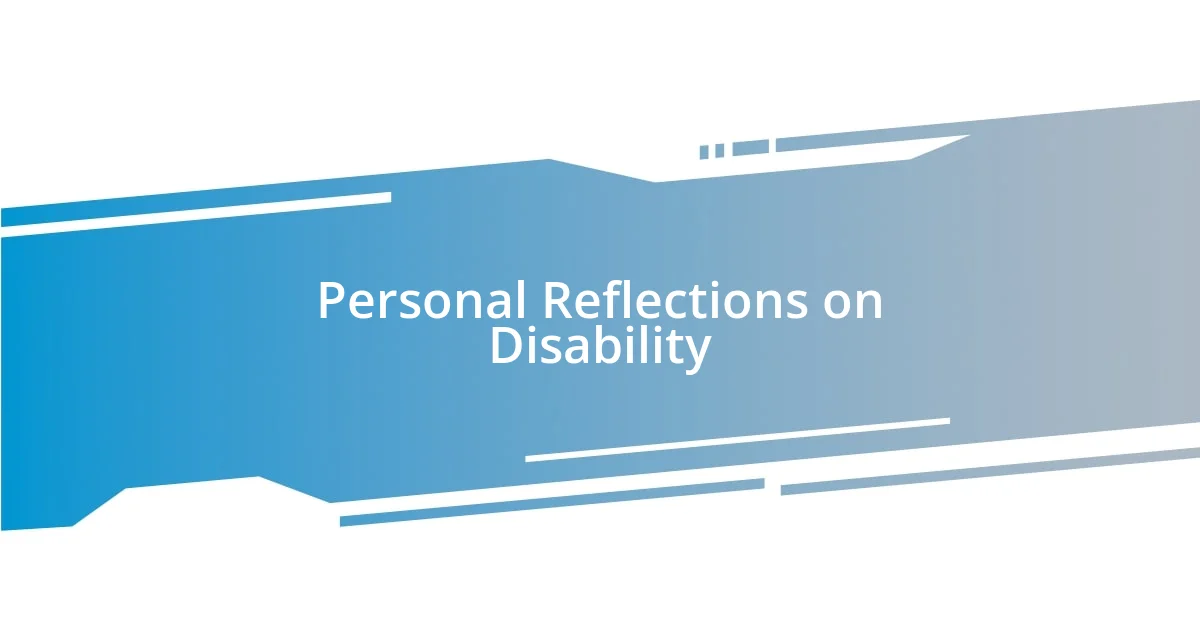
Personal Reflections on Disability
Reflecting on my personal journey with disability, I’ve come to see it as a mosaic of moments that shape who I am. Each experience, both challenging and uplifting, contributes to a deeper understanding of resilience. I often think back to a time when I struggled to find my place in social settings; it was through discussing my disability openly that I realized honesty is a powerful connector. Sharing my story sparked conversations that unveiled shared struggles, allowing me to build genuine friendships based on understanding and empathy.
- Embracing vulnerability often leads to unexpected connections.
- Each story shared contributes to the collective narrative of the disabled community.
- Moments of support remind us that we’re stronger together, lightening the weight of isolation.
In recounting my experiences, I find that the reflections of others resonate deeply with me. I remember meeting someone at a workshop who expressed feeling like a burden due to their disability. It struck a chord; I had felt that way too before. But as we discussed our journeys, I could see that transforming our stories from feelings of inadequacy to celebrating our unique narratives can shift our perspectives dramatically. I find solace in knowing I’m part of a larger journey – one filled with collective highs and lows that we navigate together.
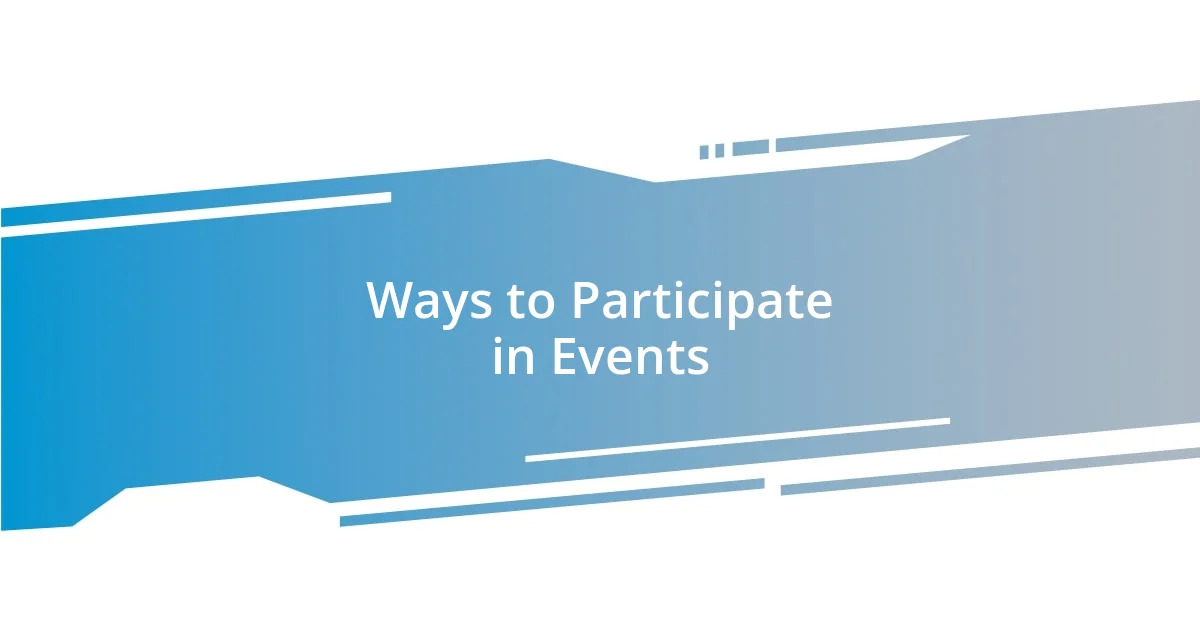
Ways to Participate in Events
Participating in Disability Pride events can be as simple as joining a local group or family to attend a parade. I remember one year, I took my niece along, and it was beautiful to see her eyes light up at all the colorful signs and joyful faces. The sense of belonging we both felt was indescribable; it made me realize that such events create a bridge for younger generations to learn about pride in disability early on.
Volunteering at events is another impactful way to engage. I once helped set up a booth that showcased local artists with disabilities. It was gratifying to see their work appreciated and celebrated. Engaging directly with the community offered me a profound connection, as I got to meet many of the artists, listen to their stories, and learn from their journeys. Isn’t it amazing how contributing your time can morph you from an observer to a vital part of that celebratory atmosphere?
Sharing your own experiences during community discussions is also invaluable. At one event, I took the stage and shared my struggles and victories. The vulnerability I embraced led to a cascade of voices, each contributing stories that mirrored my own. The room filled with a shared understanding, creating an undeniable sense of solidarity. I believe these conversations are what truly elevate our community, reminding us that our individual stories weave together to form a powerful tapestry of resilience.
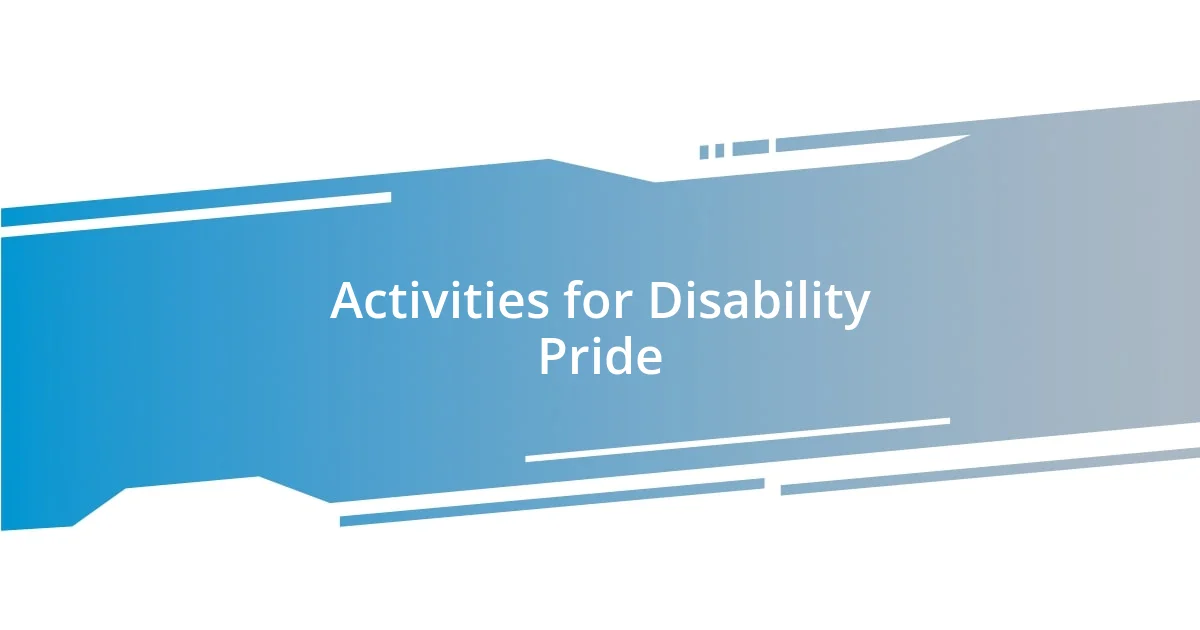
Activities for Disability Pride
Participating in creative workshops can be a fantastic activity for celebrating Disability Pride. I attended a painting session where participants expressed their experiences through art. I was amazed by the diversity of styles and perspectives, each brushstroke reflecting a unique journey. Seeing individuals unveil their creations and share the stories behind them was incredibly powerful. It honestly made me wonder—how often do we use art as a means of expressing our deepest feelings?
Another enriching activity is hosting or joining potluck gatherings. One time, I helped organize a food-sharing event where everyone brought a dish that connected them to their culture or childhood. The atmosphere was filled with laughter and stories shared over home-cooked meals. It really hit me how food can be such a universal connector and a way to highlight our unique backgrounds, making each dish not just a meal, but a celebration of our heritage. How delightful it is to break bread while honoring our diverse journeys together!
Finally, engaging in accessible sports or fitness events can be both fun and empowering. I vividly recall participating in an inclusive yoga class where everyone’s abilities were embraced. It struck me how uplifting it felt to move together as a community, adapting poses to suit different needs. The sense of unity and shared strength was palpable. I often reflect on that experience—can exercise be a pathway not just to fitness, but also to a deeper understanding of our shared resilience?
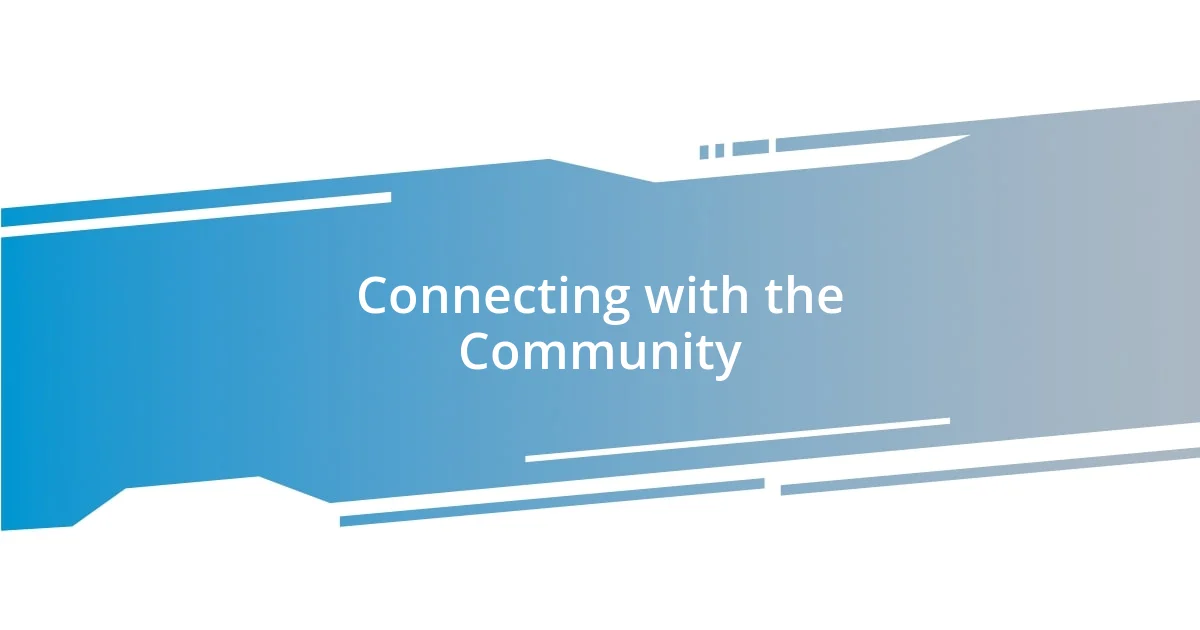
Connecting with the Community
Connecting with the community during Disability Pride can manifest in so many enriching ways. One experience that left a lasting impact on me was when I participated in a local storytelling event. Listening to others share their journeys made me realize we often hold similar fears and trials, yet we rise in unique ways. Sharing my own story amidst that supportive crowd felt liberating; it’s remarkable how our vulnerabilities can forge such powerful connections.
I’ve found that forming friendships with fellow community members often leads to profound conversations. Just last year, I reconnected with an old friend at a Disability Pride festival. As we reminisced about our childhood experiences, I was struck by how much we had both transformed while still holding on to our core selves. Those shared moments made me appreciate how important it is to nurture our relationships within this community; I wonder—how many friendships can grow from these meaningful encounters?
Another rewarding aspect is collaborating on disability advocacy initiatives. I recall working with a group on a campaign to raise awareness about accessible public spaces. The camaraderie that developed as we brainstormed and pushed for change truly showcased our collective strength. Each success, no matter how small, reinforced my belief that when we unite, we amplify our voices. Isn’t it empowering to think that our efforts can create lasting impact, not just for ourselves, but for future generations as well?
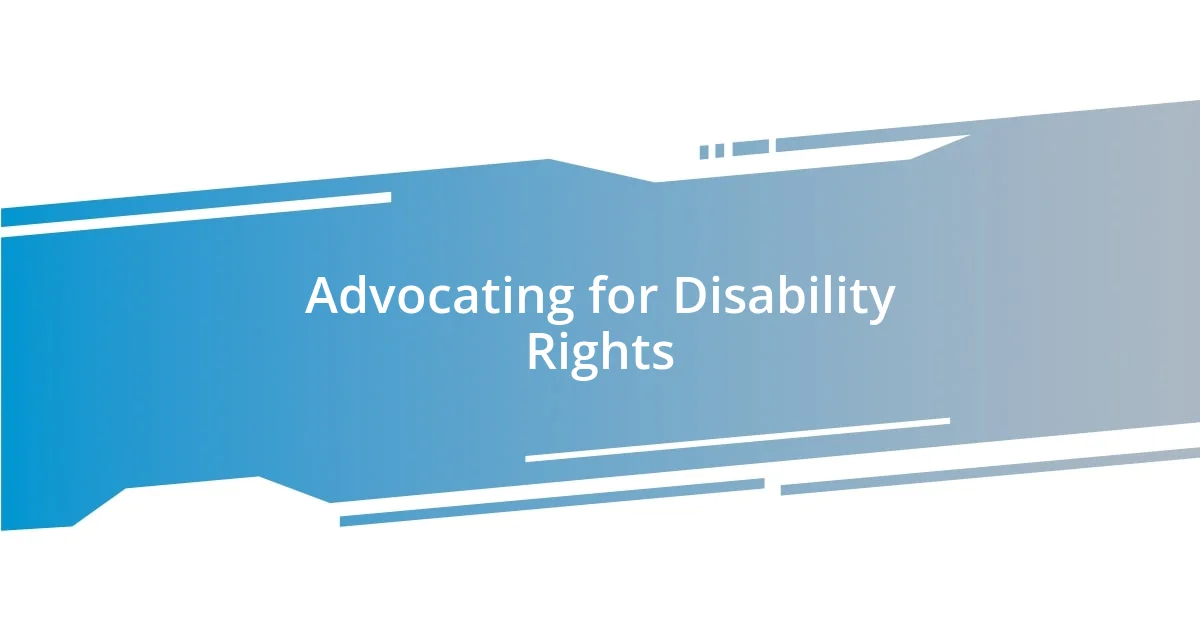
Advocating for Disability Rights
Advocating for disability rights is not just a duty; it’s a deeply personal journey. I remember joining a local advocacy group where I first learned about the intricacies of policy changes that impact our lives. Listening to a speaker share her story about fighting for accessible transportation in our city ignited a fire in me. It made me think—what would life be like if our voices could reshape policies that directly affect our daily experiences?
One of the most surprising realizations I’ve had is how powerful grassroots efforts can be. When my friends and I organized a rally to support better disability accommodations in schools, the turnout was beyond what I expected. The energy was palpable as we all held signs and chanted together. Standing shoulder to shoulder with others who shared my passion was incredibly uplifting, and it made me wonder—how often do we underestimate the change we can create when we unite for a common cause?
As I reflect on my experiences advocating for disability rights, I see the importance of educating others. I once facilitated a workshop aimed at helping non-disabled folks understand the barriers we face. It was a bit daunting at first, but witnessing the participants’ eyes widen with understanding felt rewarding. I often ask myself—how can we break down these barriers if we don’t first invite others into our world? It’s those moments of shared understanding that can spark change.
